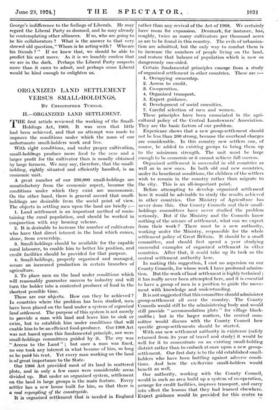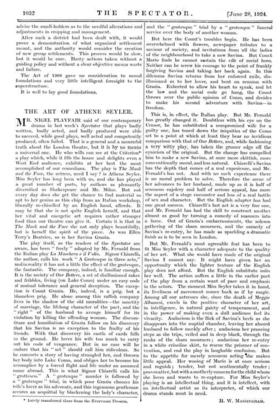ORGANIZED LAND SETTLEMENT - VERSUS SMALL-HOLDINGS.
I IFIHE first article reviewed the working of the Small- 1 Holdings Act, 1908. It was seen that little had been achieved, and that no attempt was made to improve the conditions under which the mass of our unfortunate • small-holders work and live.
With right conditions, and under proper cultivation, small-holdings produce more food to the acre and a larger profit for the cultivator than is usually obtained by large farmers. We may say, therefore, that the small- . holding, rightly situated and efficiently handled, is an economic unit.
A great number of our 280,000 small-holdings are unsatisfactory from the economic aspect, because the conditions under which they exist are uneconomic. On the other hand, there is general accord that small- holdings are desirable from the social point of view. The objects in settling men upon the land are briefly :- 1. Land settlement is an important method of main- taining the rural population, and should be worked in conjunction with any housing scheme.
2. It is desirable to increase the number of cultivators who have that direct interest in the land which comes, alone, from ownership..
3. Small-holdings- should be available for the capable rural labourer, to enable him to better his position, and credit facilities should be provided for that purpose.
4. Small-holdings, properly organized and managed, secure an increased production in certain branches of agriculture.
5. To place men on the land under conditions which will reasonably guarantee success to industry and will turn the holder into a contented producer of food in the shortest possible time. - These are our objects. How can they be achieved ? In countries where the problem has been studied, men haye been placed on the land under a system of organized land settlement. The purpose of this system is not merely to provide a -man with land and leave him to sink or swim, but to establish him under conditions that will enable him to be an efficient food-producer. Our 1908 Act was not based upon this fundamental principle, nor were small-holdings committees guided by' it. The cry was ." Access to the. Land " ; but once a man was fixed, no one took any interest in what became of him, so long as he. paid his rent. Yet every man working on the land is of great importance to the State. - - Our 1908 Act provided- most of its land in scattered plots, and in only a few cases were considerable areas divided up. But under an organized system, settlement on the land in large groups is the main feature. Every settler has a new house built for him, so that there is a real repecrpling of the countryside. It is organized settlement that is - needed in England rather than any.revival of the Act of 1908. We certainly have room for expansion: Denmark, for instance, has roughly, twice as many cultivators per thousand acres as are to be found in this country. The evils of urbaniza- tion are admitted, but the only way to combat them is to increase the numbers of people living on the land, and restore that balance of population which is now so dangerously one-sided.
Certain fundamental principles emerge from a study of organized settlement in other countries. These are :- 1. Occupying ownership.
2. Access to credit.
8. Co-operation.
4. Organized transport.
5. Expert guidance.
6. Development of social amenities.
7. Careful selection of men and women.
These principles have been enunciated in the agri- cultural policy of the Central Landowners' Association. They are the basic factors of our problem.
Experience shows that a new group-settlement should not be less than 200 strong, because the overhead charges are considerable. In this country new settlers can, of course, be, added to existing groups to bring them up to the minimum strength. The unit must be large enough to be economic or it cannot achielie full success.
Organized settlement is successful in old countries as well as in new ones. In both old and new countries, under its beneficent conditions, the children of the settlers wish to remain in the country rather than migrate to the city. This is an all-important point.
Before attempting to develop organized settlement here it would be advisable to study the results achieved in other Countries. Our Ministry of Agriculture has never done this. Our County Councils and their small- holdings committees have never studied. the problem seriously. But if the Ministry and the Councils know nothing of the science of settlement, what can we expect from their work ?' There must be a new authority, working under the Ministry, responsible for the whole settlement policy of Great Britain. It should be a small committee, and should first spend a year studying successful examples of organized settlement in other countries. After that, it could take up its task as the central settlement authority here.
In making this suggestion, I cast no aspersion on our County Councils, for whose work I have profound admira- tion. But the work of land settlement is highly technical ; it has really never been attempted here, and it is essential to have a group of men in a position to guide the move- ment with knowledge and understanding.
It is not suggested that this committee should administer group-settlement all over the country. The County Councils would still be the administering body and would still provide " accommodation plots " for village black- smiths ; but in the larger matters, the central com- mittee would • discuss with the County Council hoW specific group-settlements should be started.
With our new settlement authority in existence (safely returned from its year of travel and study) it would be well for it to concentrate on an existing small-holding district rather than to embark at once upon a new group- settlement. Our first duty is to the old established small- holders who have been battling against adverse condi- tions. And here the ex-Service small-holders would benefit as well.
Our authority, working with the County Council, would in such an area build up a system of co-operation, arrange for credit facilities, improve transport, and carry into effect the lessons that they had learned elsewhere. Expert guidance would be provided. for this centre to advise the small-holders as to the needful alterations and adjustments in cropping and management.
After such a district had been dealt with, it would prove a demonstration of what organized settlement meant, and the authority would consider the creation of new group settlements. This process would be slow, but it would be sure. Hasty actions taken without a guiding policy and without-a clear objective means waste and failure.
The Act of 1908 gave no consideration to sound foundations and very little intelligent foresight to the superstructure.
It is well to lay good foundations.















































 Previous page
Previous page